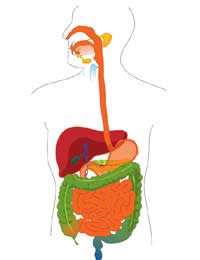How Your Digestive System Works

Sometimes it seems that most of us simply eat our food with little thought to what actually happens in the process of digestion. We might think about diets and calories but fail to consider how our food is broken down, used and how this impacts dieting and energy.
Digestive Problems and Conditions
Those people who suffer from one of many painful digestive conditions might also be interested to understand how the process of digestion works. Sometimes, we experience a health condition but know little about what goes on inside our bodies.By learning about your digestive system, people who suffer from conditions such as Crohn's disease or any other digestive illness can get in touch with their bodies and find out just how their diet plays a role in their disease.
From the First Bite
Did you know that your digestive system is actually at work prior to taking that first bite of chips or salad? When you actually smell food, your digestive system gets into gear. Saliva flows and once you take that first bite, digestive enzymes in the mouth get to work on the food. As you swallow, your food gets pushed to the back of your throat and into the oesophagus, which moves food into the stomach.Stomachs for All Kinds of Foods
Your stomach plays a key role in digestion, where it not only stores food that you've eaten but also breaks it down and empties it into the small intestine. Food basically gets mushed together with various stomach juices and muscles.Your Small Intestine
In your small intestine, foods are broken down even more, which allows your body to absorb the nutrients it needs. When you hear about foods having certain vitamins, minerals or proteins and fats, for instance, all of these are absorbed in the small intestine. Other parts of the body such as the pancreas, liver and gallbladder release important fluids to help process all of this food. The liver also plays a key role in filtering out waste as well.Many people don't realise it but food can spend hours in the small intestine, but it is certainly time spent well because all of the nutrients in your food can pass into the blood and liver, providing fuel to your body. Unfortunately, excess food and calories can also be stored in the body, leading to weight gain.
Your Large Intestine
With all the waste left after nutrients are removed from your food, your body has to do something with it, which is where the large intestine comes into the picture. Here, food passes through the colon structure of the large intestine to the rectum – then it is all removed when you go to the toilet, of course.Important Facts
It may seem like a lot of information that you don't really need to know, but understanding how your digestive system works is helpful when planning out healthy meals and aiming to reach and maintain your ideal, healthy body weight. If you can understand how food is processed and where nutrients and calories go, you can get in touch with your eating habits and make better dietary choices.- What Are Digestive Genes?
- Broccoli to Fight Tummy Problems
- Digestion and Super Foods
- Fast Foods and Your Tummy
- What You Don't Know About Food Poisoning
- How Vegetarianism Affects Digestion
- How Food Labels Can Be Wrong
- The Effect of Positive Bacteria on Your Stomach
- The Effect of Wheat on the Stomach
- Red Meat and Your Stomach
- Too Much Caffeine and Your Stomach
- The Problem With Fats And Your Stomach
- Nicotine and your Stomach
- Controlling Irritable Bowel Syndrome with Diet


Re: What is Causing This Pain Under the Ribcage?
from lat. manus - "hand" and scribo - "I write") ]
Re: Symptoms of Stomach Migraines
When I started menopause 8yesrs ago I had my first stomach attack. With me I start to sweat profusely then comes the pain so…
Re: How Cauda Equina Syndrome Affects the Stomach
I have had cauda equina syndrome now for 10 years. For a considerable amount of that time I took…
Re: Symptoms Of Peptic Ulcers
I also have this chest pain and my heart is beating very fast and painfull and the other thing is that my left side breast it pains.i…
Re: Symptoms Of Peptic Ulcers
I was diagnosed of gastric ulcer after I went for an endoscopy. I have used intravenous rabeprazole and now am using ulsakit. But I…
Re: Symptoms Of Peptic Ulcers
Hello guys, first all of you have to visit gi. And done ugd, then only Dr have to came to know what happened inside your stomach. Yes…
Re: What is Thickening of the Bowel?
I had a virtual colonoscopy and was told I had a thickened left colon. I have acute bouts of lower left abdominal pain which…
Re: What is Thickening of the Bowel?
HI CAN SOME BODY TELL ME WHAT MILD SMALL BOWEL VERSUS IN THICENING RELATED TO UNDERDISTENTION MEAN?
Re: Symptoms Of Peptic Ulcers
Princess gold - Your Question:I av ulcer and I feel tiredness, dizzy, pain under my left breast ? Is it still a sign of ulcer ?
Re: Symptoms Of Peptic Ulcers
I av ulcer and I feel tiredness, dizzy, pain under my left breast ? Is it still a sign of ulcer ?